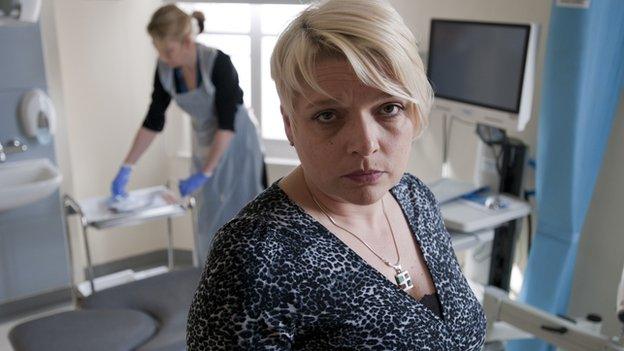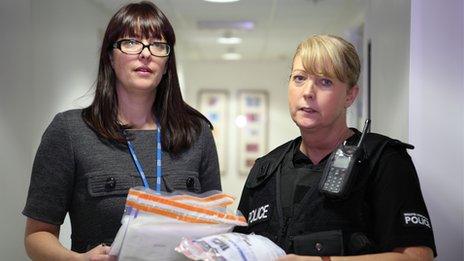Breaking the taboo: One rape victim tells her story
- Published

It is estimated that 12,000 men and 85,000 women on average are raped in England and Wales every year, but it is not an issue that is talked about openly. One woman has waived her anonymity and bravely spoken about her story, from reporting the attack to bringing her rapist to justice.
"My identity isn't 'I got raped', it's not. I am Juliet, but I'm forever altered."
Juliet was attacked and raped by a stranger in an alleyway after leaving a bar in Manchester on New Year's Eve 2011. It has changed her life.
"One event and your life isn't ordinary any more," says Juliet. "I don't know, maybe you become extraordinary because you survived it, that would be a good way to put it, and maybe that's how I'm managing to cope now."
She had gone to the bar in Manchester city centre alone as a friend had not shown up and sat on a bar stool drinking, but after consuming a shot of alcohol suddenly felt very drunk and was escorted outside by the door staff.
CCTV footage captured Juliet outside the bar at almost midnight, but she then disappeared out of shot and is only seen again two hours later, staggering from a nearby alleyway.
There were no witnesses to the assault that took place during this time and she has vague memories but no recollection of the entire attack.
As New Year's Day wore on, Juliet started to realise what had happened after she began to feel pain. She rang the police who referred her to St Mary's Sexual Assault Referral Centre in Manchester, one of 46 specialist centres in the UK offering support, counselling and care to rape victims, as well as gathering forensic evidence to help secure a conviction.
It can take a long time from the moment a sex offence occurs to reaching a verdict in court, and many victims drop out before the trial. St Mary's aims to support them throughout the process.
Stigma
Bernie Ryan, the centre's manager, says rape is still considered a taboo issue in society.
"We're all frightened by this type of crime," says Ryan. "We're all frightened about the stigma that it attracts and what people will say, and I think we need to get over that fear and talk about it openly."
Not having a bath, shower or wash after an assault is extremely difficult but considered better for collecting forensic evidence.
Juliet was seen by a forensic doctor and a crisis worker, part of the all-female team at St Mary's.
"They said that however difficult it was going to be for me, that she would be as gentle as she possibly could, but she did need to get the evidence and she said you know at any point you can stop and have a breather.
"A far cry from the old days, where you'd have a male doctor examining you, probably in a police station somewhere. That to me would be horrifying."

Staff at St Mary's Sexual Assault Referral Centre work closely with the police
DNA samples were taken and Juliet was examined. The medical team found bruises and abrasions on her body and the swabs were found to contain semen, proving someone had sexual intercourse with her without her knowledge.
On 3 January 2012, she went to the police station where her version of events was filmed and recorded on a DVD to be used in a future trial.
Rape by a stranger is rare and it is estimated that 90% of rape victims know their attacker, who could be a partner, ex-partner, relation, friend or colleague.
'You feel stained'
The attack on Juliet was investigated by detectives in Greater Manchester Police's serious sexual offences unit. They had a breakthrough when they discovered a "DNA hit" - DNA from Juliet's swabs matched that of a 20-year-old male called Mustafa Yussuf.
He was brought in for questioning and after refusing to comment at first, later claimed that the sex was consensual and he had been drunk. However, CCTV footage of Yussuf at 23:57 on the night in question established he did not appear to be intoxicated at the time of the attack.
The Crown Prosecution Service (CPS) is responsible for determining if there is enough evidence for a rape case to go to court and Alison Mutch from the Greater Manchester CPS says CCTV footage showed Juliet had been too drunk at the time to have consented to sex and so the case proceeded.
She said it was important for the victim not to blame themselves for having drunk alcohol.
"If you had a burglary trial you wouldn't blame the victim of burglary because they'd left their front door unlocked when they went to bed," says Mutch. "You wouldn't say, 'Oh well they deserved to be burgled' would you… well I hope not, and acquit as a result."
Statistics have shown that many victims do not report attacks to the police. According to figures taken from the Crime Survey for England and Wales and published in an overview of sexual offending, external by the Office for National Statistics, the Home Office and the Ministry of Justice in January 2013, there are around 473,000 adult victims of sex offences every year.
Yet only 53,700 sex offences were recorded as crimes by police in 2011-12 and an average of 5,620 offenders convicted.
In 2012/13 there were 3,692 prosecutions for rape, resulting in 2,333 convictions, and the study indicates that when a rape case does get to court, about 62% of cases ended in a conviction, but about 38% of trials result in a not guilty verdict.
"It's not that the jury haven't believed the victim, it's that they haven't been sure beyond reasonable doubt that the defendant is guilty," says Mutch, "and this perception that somehow all these acquittals must mean they've been false allegations of rape just isn't right."
The psychological impact the attack had on Juliet was traumatic.
"I couldn't even get to the shops without freaking out and running home," says Juliet, "because you feel stained, you feel contaminated, you feel like everything you touch is going to be soiled with what has happened to you."
Six months after the assault took place Juliet gave evidence behind a screen at the trial and was accompanied by Gail Morgan, an independent sexual violence adviser at St Mary's, who had supported her at the centre throughout the investigation.
"It was probably the most challenging thing I've ever done in my life, the most scary, but not by far as frightening as what I thought it was going to be," says Juliet.
Yussuf was found guilty of rape, sentenced to seven years and nine months in prison and put on the sex offenders register.
After the court case was over Juliet visited the police station to pick up the shoes she was wearing at the time of the attack. They had been held as part of the investigation and the police were surprised that she wanted to keep them.
"What was weird was the reaction I got from the police when I said, 'Well, I want them back,'" says Juliet. "I said, 'They're my beautiful, lovely, expensive shoes, and my shoes didn't rape me, I want them back.'"
With rape, control is taken away from the victim, but putting on her shoes again means Juliet can start walking towards the future.
- Published10 January 2013
- Published23 July 2012
- Published28 March 2012
- Published12 March 2012